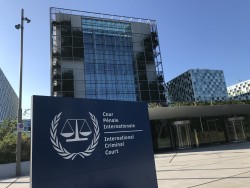
Death by ransomware
On 10 September 2020, ransomware infected 30 servers at University Hospital Düsseldorf, crashing systems and forcing the hospital to turn away emergency patients. As a result, German authorities stated, a woman in a life-threatening condition was sent to a hospital 20 miles away in Wuppertal and died from treatment delays. On 28 September, another alarming news article stated that ‘a…
Read more
National security and the processing of personal data
On 10 October 2018, ‘Convention 108’ of the Council of Europe regarding the ‘automatic processing of personal data’ (1985) was updated. Convention 108+ now explicitly incorporates the processing of personal data in a national security context. The Netherlands signed Convention 108+ on 10 October 2018 and is now in the ratification process. Surprisingly, Convention 108+ did not gain much…
Read more
Three lessons on the relationship between EU and national law in the context of the duty of consistent interpretation
Is it possible to avoid a conflict between EU and national law that would result in a national court disapplying the conflicting national provision? Under certain circumstances, the duty of consistent interpretation can offer a solution. For example: two individuals conclude a sales contract, which one subsequently claims is void under EU law whereas the…
Read more
Biopolitics and the Coronavirus: in Defence of Giorgio Agamben
In some recent blog posts, Italian star philosopher Giorgio Agamben frames the governmental response to the outbreak of the coronavirus in Italy and elsewhere as ‘frenetic, irrational and entirely unfounded’. According to Agamben, Covid-19 is not too different from the normal flus that affect us every year. The governmental reaction to the outbreak would be…
Read more
The International Criminal Court at 18 years: Things to Watch in 2020
The International Criminal Court (ICC) turns 18 years old in 2020. As such, we can look back on the Court’s ‘childhood’ and forward to its first year as an adult. Like all childhoods, there have been ups and downs, successes and lessons learned. There have been four final convictions against individuals for crimes against humanity…
Read more
NGOs, National Human Rights Institutions: Crucial intermediaries in the execution of ECtHR judgments?
‘The lack of implementation of the D.H. judgment deeply concerns the three submitting organizations…’. This sentence is taken from a Rule 9 Communication submitted by three NGOs to the Committee of Ministers, the body that supervises the execution of judgments of the European Court of Human Rights (hereafter: ECtHR or Court). It is illustrative of…
Read more
An Ethics of Just Judgment for Transnational Challenges
You are sitting at your desk – as an academic, lawyer, policy maker or judge. You are pondering a legal issue and need to figure out what the law on this matter means for the question at hand. It can be as simple as having to decide whether a tricycle falls under the local prohibition…
Read more
Being Realistic About Law
Legal philosophers are often criticised for being out of touch with legal practice. At best, their theories provide a highly abstract but dated understanding of what law is. In a recent prize-winning book entitled A Realistic Theory of Law legal philosopher Brian Tamanaha argues that this often heard critique is true. Many legal philosophers fail to adequately…
Read more
Truth Commissions and Social Justice: Modesty is in Order
From Peru to Canada to East Timor, following periods of serious conflict or gross human rights violations, societies often look to address the past in order to bring about greater accountability (trials), reparation (victim compensation), and truth (truth commissions). To date, more than 40 truth commissions have been established around the world, with the South…
Read more
Transformative Reparations for Victims under International Law: Changing the Game or More of the Same?
Reparations are an old concept in both domestic and international law. Victims have long been repaired in some way for the harms they suffered themselves, to their families or property. Following World War II, victims received some type of reparation, usually paid by the State, for their profound losses, and just last year the Dutch…
Read more

